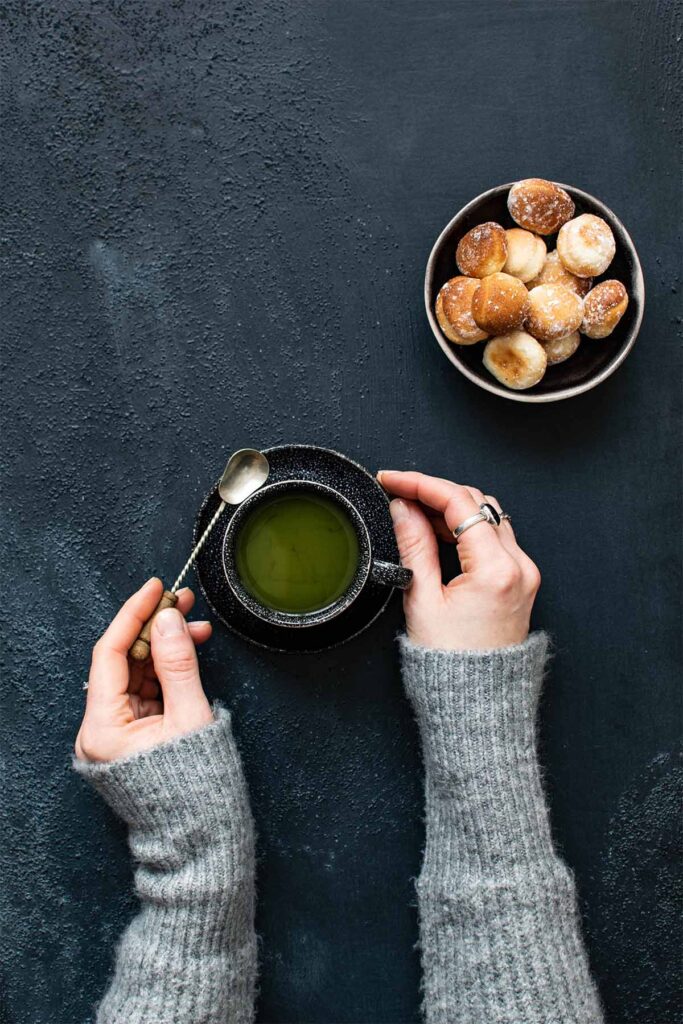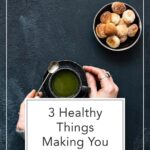Just because someone said it’s healthy doesn’t mean it is. Learn three surprising things making you more unhealthy inside this post.

It’s easy to get sucked into the black-and-white trap of health. It’s either good or bad, healthy or unhealthy. Leaving many people attempting tasks and eating foods that perhaps are healthy for some but not others.
The problem with this picture is it diminishes the secret of health. That secret is what your body is doing with what you provide. And that shifts the focus from perfecting the external ideas to understanding how your body reacts.
Health requires internal awareness.
Of course, health takes work. You’re going to have to do things to create it. But don’t get so lost in doing that you miss how your body is responding. Pay attention to what your body needs and do more of that. And remember, anything out of balance becomes unhealthy—even healthy things taken to a new level become unhealthy.
In this podcast, I share three healthy things making you unhealthy. It’s always about balance.
When good things turn bad
It’s hard to imagine how anything good can turn bad. I know we hear about it like drinking too much water can end in death. Or working out too much and for prolonged periods can lead to injury. But I find myself excusing these situations as extreme cases.
Yet, I’ve learned the hard way that not every healthy thing is healthy. And it doesn’t even take living at an extreme level for it to pull you out of balance.
It all depends on your energy threshold.
After I crashed and burned from doing all of the ‘right’ things the health space seemed to require, I had to re-evaluate this. Nothing I was doing felt extreme. Looking back, working out multiple times a day isn’t normal. But outside of that, I ate all of the diet foods, and yet even then, I found myself sick.
My body had reached its energy threshold because I had pushed it out of balance.
I fear this is what happens in the health space. We take healthy things to an unhealthy degree, pulling you into unhealthy territory. And I can assure you there is nothing more frustrating than trying to do the right things and ending up more unhealthy than you started.
That’s why I bring you this warning. To remind you, the only thing that matters is how your body responds. The only thing that matters is maintaining a healthy energy flow and keeping your body safe to thrive.
Anything that makes your body feel unsafe or disrupts your flow of energy is more unhealthy than it is healthy. That includes your mind, body, and soul.
In the podcast, I share all three, but here, I will leave you with one healthy thing that makes you unhealthy. That thing is knowledge consumption.
Unhealthy Trait: Taking In Too Much Information
Statistics on information consumption are so startling it’s hard to process them as real.
Information scientists have quantified that in 2011, Americans took in five times as much information daily as they did in 1986. That’s the equivalent of 174 newspapers. Today, they have found the amount of data that enters the brain in an average person is roughly 74 GB per day. And every year, that number increases by roughly 5% more.
To compare that, 500 years ago, 74 GB of information would be what a highly educated person consumed in a lifetime through books and stories (1).
Of course, there is a gift to knowledge, but we fail to comprehend the work involved in sorting that knowledge out. We fail to see that some of the information is blocking you from thinking for no other reason than it’s humanly impossible to comprehend it all, let alone process what you’ve forced it to.
In the end, it leaves me questioning, is the information you’re consuming helping you or hurting you?
The Dawn of Analysis Paralysis
Since the dawn of the internet, humans have developed a newer mental hurdle called analysis paralysis. Analysis paralysis is the inability to make a decision or take action because your mind is overwhelmed with information.
Although, arguably, it’s been around since the beginning of creation, considering we’re just not great at multitasking. Our attention likes to commit to one area of focus. When you redirect that focus, it redirects your energy, reducing the power those thoughts contain.
But analysis paralysis also shows us why obtaining more knowledge doesn’t actually make you wiser or more likely to take the steps associated with that information. Even though we know having more knowledge doesn’t change a thing. You change based on what you do with that knowledge.
Like everything in the body, there is a threshold between collecting and learning information. Gathering information is a survival pursuit.
I’ll never discount the benefit of having information, but more than knowing is what you do with what you know. Because the action helps your brain sort through what is worth maintaining and what you need to toss out.
The difference between knowledge and wisdom
Think about it like a squirrel collecting nuts. There is a real purpose in the collection of nuts, like the collection of knowledge. They’re putting the work in, investing in the knowledge, knowing they will need those nuts to make it through the winter.
But what would happen if they spent all of that time collecting the nuts and collecting more nuts but failed to use them?
The nuts would overwhelm the system and even begin to rot. Not to mention, a squirrel collecting nuts but not using them would lead to starvation of the animal and eventually its death.
I know it sounds silly. It would never happen that way. This is true because the squirrels don’t just collect, but they learn by doing and eating the nuts, creating the wisdom to do it again and again.
That’s the difference: the doing creates the experience, and the experience creates the stored memory combined with knowledge to create wisdom.
Knowledge without wisdom is just information opening the door for you to compare to other knowledge, creating contradictions and confusion inside your mind. This is where too many of us land.
Having all of the knowledge but lacking wisdom for the simple reason that we’re failing to take action on what we’ve learned. We’re failing to do something that will help process the information, creating congestion inside your mind.
Yes, knowledge matters, but only to the degree you use it. It matters only to the degree that it becomes wisdom to shape the knowledge you consume.
Gathering knowledge is not wrong, but that must be balanced with mental space. Take a break from learning and start doing something with the information you have.
How to Build Wisdom
My crutch is to believe I don’t have enough or even the right knowledge. But, gathering more knowledge only leads me to need more information to clarify what I have. It leaves me confused and overwhelmed.
But I’m here to remind you, especially in health, that no one knows what your body needs but you. And the only way to see if it’s working for you is to test it. To do something with it, and from there, in good or bad, you’ll have the wisdom to sort through the knowledge and take the right next step.
But without action, you’ll be lost inside your head. You’ll keep piling on new information and ideas. Some may contradict what you already have inside your brain, leading to confusion, which works to keep you stuck.
Can I tell you how unfulfilling this life is?
Research has found those who are less aware and educated are also more fulfilled. All because they live with less confusion and chaos, creating room and space for them to think, experience, and live.
Doing creates the outcome. Without doing something with what you know, information is worthless. It’s only stealing energy, becoming one of your greatest energy blocks.
Tips to Stop Overthinking And Start Doing:
- Be mindful of how much you consume.
- Create mind space for you to think on your own.
- Take action on your knowledge.
- Evaluate the action, creating wisdom.
